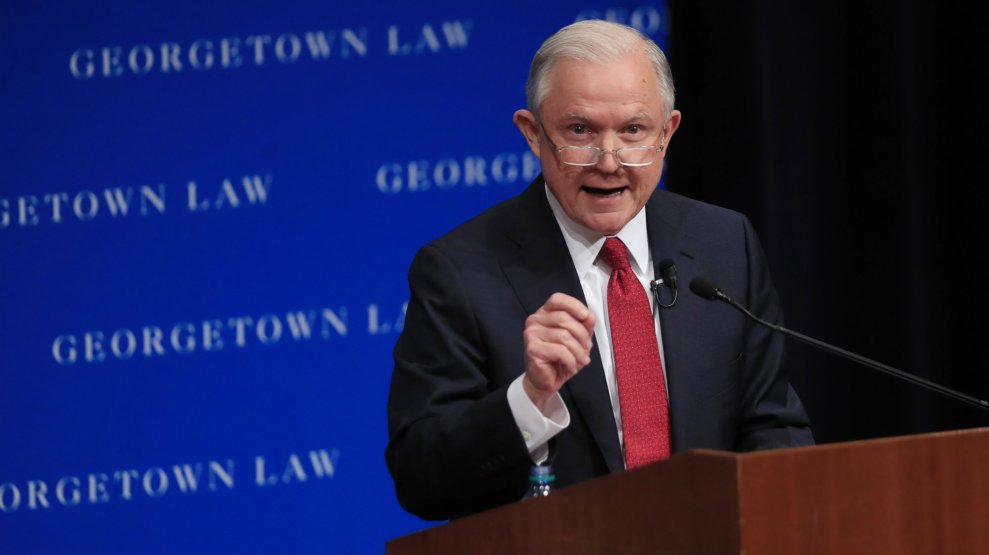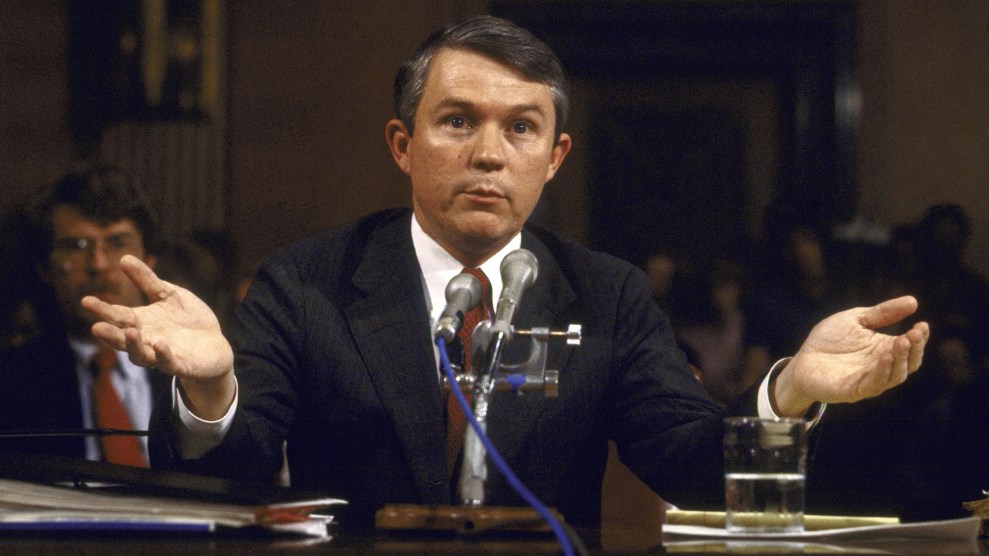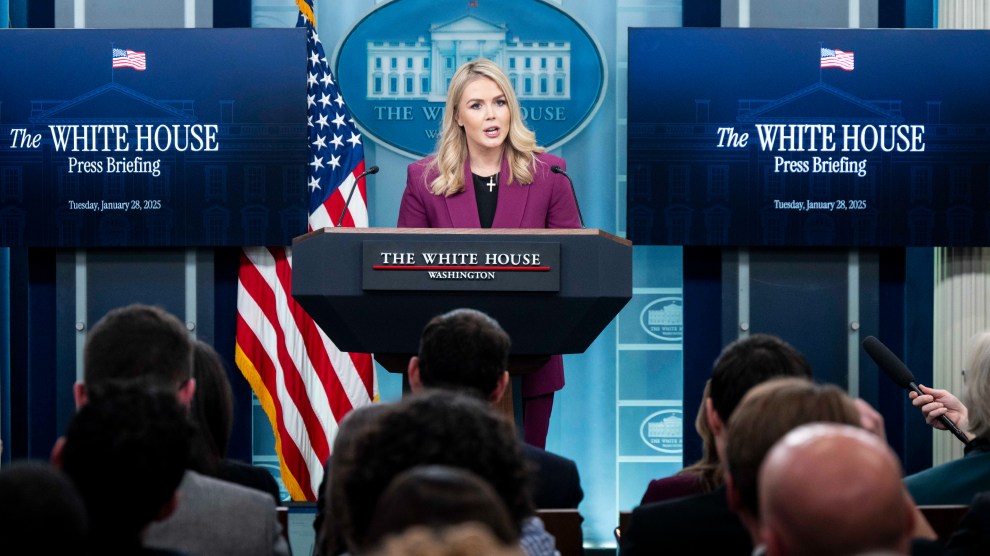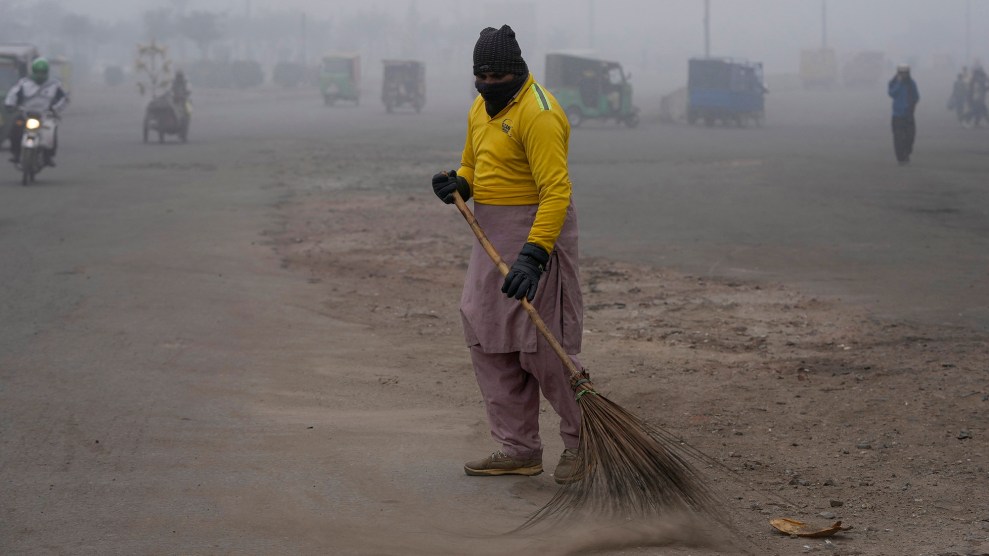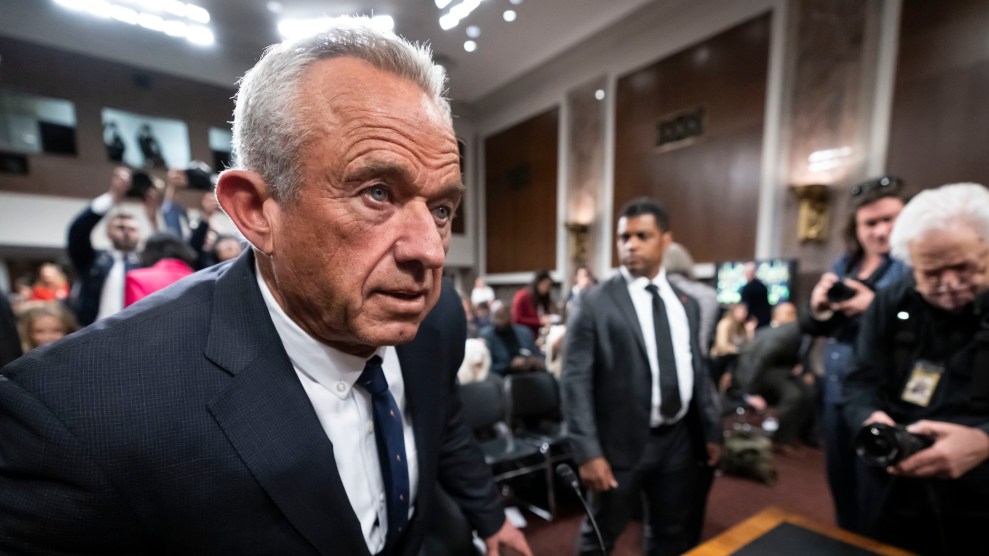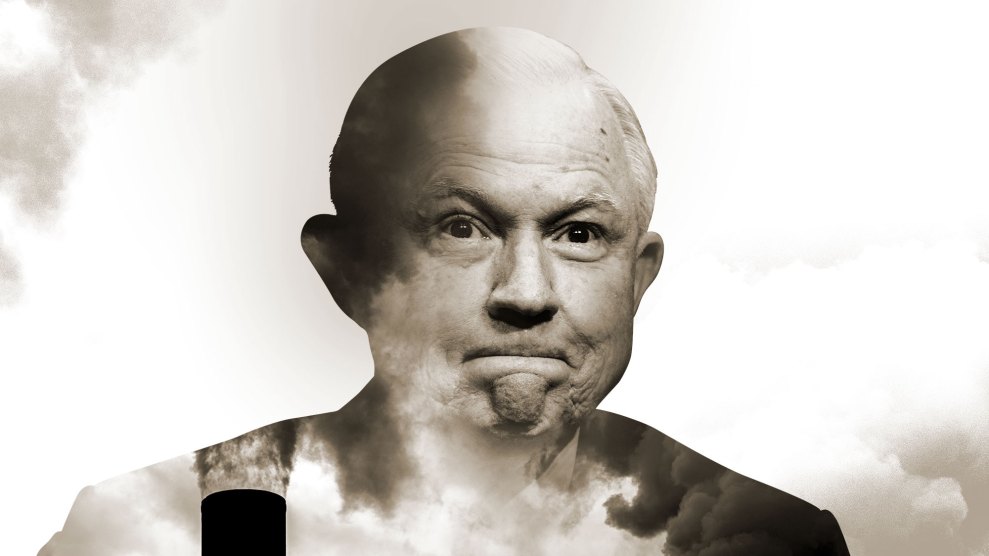
Photo by Bill Clark/AP; illustration by Mother Jones
In recent months, a political bribery scandal has gripped Alabama involving the state’s largest coal company and the powerful, politically connected law firm it retained to fend off a federal effort to clean up a badly polluted North Birmingham neighborhood—an undertaking that could result in major financial liability for the company. The controversy has already ensnared one state lawmaker, and it has cast attention on the actions of other Alabama politicians, including the one ultimately responsible for overseeing the bribery case and potential environmental litigation: Attorney General Jeff Sessions.
During his 20 years as a US senator, Sessions pocketed hundreds of thousands of campaign dollars from both Drummond Company, the corporation at the heart of this scandal, and its Birmingham-based law firm, Balch & Bingham. But his ties to Drummond and Balch extend beyond the usual political contributions. Last year, according to documents obtained by Mother Jones and the nonprofit Project on Government Oversight, Sessions intervened to oppose the Environmental Protection Agency action at issue in the bribery case, and he did so just weeks after conferring with Balch lawyers.
Sessions could potentially be a witness for the prosecution in the case his agency has been overseeing. And that would pose a serious conflict of interest. Yet Sessions, who filled a key Justice Department position with a Balch lawyer and who was prepped for his confirmation hearing by an attorney at the firm, has so far taken no steps to recuse himself.
“The People Are Dead”
The roots of the Drummond bribery case trace back to one of the South’s most industrialized areas—and one of its sickest. The residential blocks of North Birmingham along 35th Avenue are lined with small, low bungalows on postage-stamp lots, tucked between towering piles of industrial byproducts and sprawling industrial complexes. Among the plants is Drummond’s ABC Coke facility, where raw coal is baked into the dense fuel used in industrial foundries.
This area was once a bustling enclave—one of the few places in the city where African American families could live, due to rampant housing discrimination—but it has fallen eerily quiet. Those who could afford to move away have long since packed up; those who remain, trapped by grinding poverty, try to stay indoors.
In 2012, the EPA reported finding in the neighborhood high levels of chemicals known to cause serious health problems, including lead, arsenic, and benzoapyrene. Federal health authorities have told parents it’s not safe for kids to play in their own yards. Everyone seems to know someone afflicted by cancer or respiratory illnesses.
“In the last 10 or 15 years, everyone is gone, the people are dead,” says Keisha Brown, 44, who has lived in the neighborhood all her life. “Some people out here have two cancers.” Brown says she suffers from respiratory problems and fears for her health. “I pray every day the Lord keep me.”
In a 2014 documentary on the neighborhood made by Gasp, a Birmingham-based clean-air advocacy group, neighborhood residents tick off long lists of people they know who have been diagnosed with cancer. In one heartbreaking scene, Lillie Doss Ford, a resident of the Collegeville section of North Birmingham, described the death of her five-year-old grandson, Mario.
“He developed severe headaches,” she recalls in the video. “His was brain cancer. And by the way, his father died, and his grandmother on his father’s side died. And they lived in that area also; they died from cancer. Cancer did him so bad until he asked us one morning a couple weeks before he died, ‘Mama, when is Jesus going to come get me? I’m tired of hurting.’”
Industrial pollutants are well known to present health risks, yet it is notoriously difficult for public health officials to tie a particular source of pollution to ailments of particular people. At least one study has found increased odds of preterm birth for children whose mothers lived near 35th Avenue’s cluster of industrial plants. Other public health studies are in the works.

A boy plays in North Birmingham.
LeRoy Woodson/NARA/EPA
In 2013, the EPA designated this area a Superfund site and named five “potentially responsible parties”—companies that were possible sources of the pollution and who under Superfund rules could be held financially responsible for the cleanup. One of those firms was Drummond.
When the agency spends millions cleaning up a polluted site, it typically tries to recoup these costs from the offending parties, sometimes working in conjunction with the Justice Department to pursue companies in court for cleanup expenses. Often, polluters will come to a negotiated agreement to pay a share of the costs or will offer to undertake the cleanup themselves, if they believe they can do so at a lower cost.
There are thousands of eligible Superfund sites across the country. But unless a site is added to the EPA’s National Priorities List (NPL), the responsible polluters are likely to avoid ending up in court and having any cleanup expenses foisted upon them.
The 35th Avenue site quickly emerged as a high-profile case at the EPA, one that senior officials monitored closely. The sheer size of the site, covering 400 acres, and its proximity to residential neighborhoods caught their interest—and so did the unusual political dynamics of the case.
Since 2015, despite the demands of neighborhood residents and environmental groups, the EPA has held back on adding the site to its priorities list, citing stiff opposition—if not outright hostility—from state lawmakers and other officials eager to protect Drummond, one of the state’s largest companies.
“There just was a lot of conflict,” says Stan Meiburg, the EPA’s former Region 4 deputy administrator, one of the most senior officials at the agency in charge of the 35th Avenue site. “All the various local officials seemed to be at odds with each other about how to proceed. That was a little unusual.”
Mustafa Ali, who until earlier this year was the head of the EPA’s environmental justice program, recalls visiting the neighborhood several times, where he witnessed the political pushback to the cleanup effort firsthand. “There’s some very powerful interests who are trying to stop them from being on the NPL list, and that’s because they don’t want to have to take responsibility for the pollution that’s there,” Ali says.
In the absence of a large-scale cleanup, the federal government has issued recommendations on how to reduce the health risks of living in an area contaminated by toxins and carcinogens. The advice is not encouraging. The federal Agency for Toxic Substances and Disease Registry, for instance, has warned that children who “engage in activities like digging with shovels…and playing with toys…on the ground surface…are especially at risk.” A pamphlet Brown received discouraged residents from chewing gum outside.
“It’s Cheaper to Pay for a Politician”
In December 2014, in the middle of the EPA’s effort to solicit public opinions on what the government’s next step on the site should be, representatives of the advocacy group Gasp met with Oliver Robinson, a Democratic state representative who represented a section of North Birmingham called Tarrant, which neighbors the 35th Avenue site.
The EPA was considering expanding the Superfund location to include Tarrant, and Gasp was seeking Robinson’s help getting the site added to the national priorities list. While Alabama’s Republican governor and many other elected officials were opposed to listing the site, Robinson sounded sympathetic. Yet when he subsequently appeared before a state environmental panel, he vehemently argued against any additional EPA action. He also sent letters to state environmental officials urging them to oppose the EPA’s activities.
Michael Hansen, Gasp’s executive director, was stunned. “It was not what we expected, at all,” he says. “It was shocking that someone who feigned interest represented the people suffering.”
This June, Alabama’s acting US attorney for the Northern District of Alabama unveiled a litany of criminal charges against Robinson that went a long way toward explaining the lawmaker’s apparent reversal. Robinson pleaded guilty in September to bribery and wire fraud, admitting that he and a nonprofit he controlled accepted at least $360,000 from parties connected to Drummond in exchange for his opposition to the EPA’s cleanup plans. (Robinson has not been sentenced, but the Justice Department has agreed to seek reduced penalties, if he cooperates with prosecutors.)
In September, the Justice Department followed up by indicting David Roberson, Drummond’s vice president of government and regulatory affairs, and Balch & Bingham partners Joel Gilbert and Steven McKinney for arranging the payoffs to Robinson. (Attorneys for all three men issued statements proclaiming their clients’ innocence. All three have pleaded not guilty.)
The Justice Department’s indictment accuses the three of conspiring to “protect ABC Coke and Drummond Company from the tremendous potential costs associated with being held responsible for pollution within the affected areas.”
The indictment continues: “They sought to accomplish this goal by working to prevent EPA from listing the 35th Avenue Superfund Site on the National Priorities List and expanding the Superfund site into Tarrant and Inglenook.”
According to prosecutors, Robinson signed a secret contract with Balch & Bingham, agreeing that his eponymous foundation, originally set up to run an annual “Black Achievers Awards Gala” and publish a magazine about community investment, would not engage in work opposing anything involving Balch & Bingham’s clients. Robinson was instructed by Gilbert and McKinney to surreptitiously record meetings with EPA officials and activists and to send letters ghostwritten by Balch attorneys on official stationary, according to the indictments the Justice Department handed down in September. Balch attorneys, the indictments allege, set up a tax-exempt organization called the Alliance for Jobs and the Economy in order to funnel donations from Drummond and other unnamed companies to Robinson’s nonprofit, which employed several family members.
Balch & Bingham has placed McKinney and Gilbert on indefinite leave and removed their online bios. In a statement, the firm distanced itself from the bribery charges facing its partners, saying, “We believe strongly that our firm is not implicated more broadly in the alleged conduct.” Meanwhile, Drummond has suggested its Balch & Bingham lawyers are at fault if any laws were broken: “Drummond retained one of the state’s most respected environmental law firms. The law firm engaged the Oliver Robinson Foundation to perform community outreach in connection with the matter, and Drummond understood this process was lawful and proper.”

Drummond’s ABC Coke plant in 1993.
Jet Lowe/NARA/EPA
This isn’t the first time Drummond has gotten caught up in a political bribery case. In 1979, the Justice Department charged CEO Garry Drummond, along with two other executives and a company consultant named Walter Johnsey, with 19 counts of racketeering and extortion. Also charged were a state representative and two former state senators, who the government alleged the Drummond officials had plied with cash, prostitutes, travel, and other perks in exchange for political influence and inside information on the state’s biggest utility company.
A federal court dismissed those charges a year later, and Garry Drummond and Johnsey, who became president and CEO of a Drummond subsidiary in the 1980s, continued to wield enormous clout in Alabama. Like a mini-Koch brothers network, they harnessed their coal profits to create a web of political action committees and nonprofits to advance their political and corporate agenda. In 2004, a prominent Alabama political columnist called Johnsey “the most influential political man in Alabama politics for close to three decades.”
Garry Drummond died in 2016 as one of Alabama’s richest citizens, having built Drummond into a huge company—and one of the state’s biggest political juggernauts. Since 2013, the company has donated $1.3 million to state lawmakers and political actions committees, making it among the state’s most generous donors. That figure does not account for the company’s extensive use of politically active nonprofit groups that do not have to report their donations.
Drummond was a major political benefactor of former Alabama Gov. Robert Bentley, who resigned in April amid an embarrassing sex scandal. Bentley’s administration fiercely battled the EPA’s Superfund push in North Birmingham, yet he was hardly alone. Among the state officials who assisted Drummond and Balch was one of the longest-serving members of the state Legislature, Republican Sen. J.T. “Jabo” Waggoner, who in 2015 successfully introduced a resolution opposing the EPA actions at the 35th Avenue Superfund site. According to the Justice Department, the measure was in fact authored by Balch’s Joel Gilbert.
Then-Alabama Attorney General Luther Strange, who in September lost a Republican Senate primary runoff to former state Supreme Court Judge Roy Moore, sent detailed letters to the EPA in October 2014 and January 2015 opposing its efforts in North Birmingham. Drummond gave Strange a $25,000 campaign contribution less than a week before the first letter and another $25,000 donation a month after the second. Strange’s Senate office did not respond to requests for comment.
Strange’s ties go deeper still. The head of his Senate campaign’s finance team, Mike Thompson, was one of two directors of the Alliance for Jobs and the Economy, the outfit that made payments to Robinson’s nonprofit. The other was Drummond’s David Roberson. US Attorney Jay Town recently told the Birmingham News that Thompson “is not the subject or target of any investigation run out of my office.”
To date, the Justice Department hasn’t charged any public official aside from Robinson with a crime. But Town has made it clear the investigation is not over.
“This is the worst type of public corruption,” Town said in late September. “It was all done for the greed of a few and at the expense of so many families and children living in potentially toxic areas. It’s cheaper to pay for a politician than it is to pay for an environmental cleanup.”
US Attorney Jay Town, right, discusses indicting two lawyers and a coal executive on bribery charges at a September press conference. Jay Reeves/AP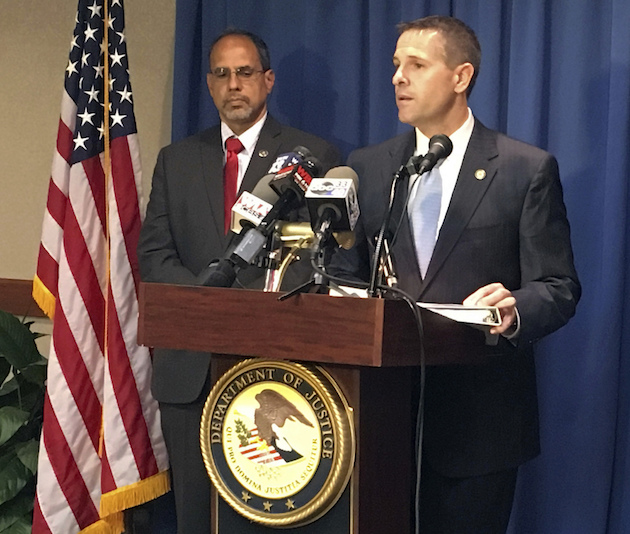
“Recently, Balch Has Met With Senator Jeff Sessions”
The ongoing case could get awkward for Town’s boss, Jeff Sessions. According to OpenSecrets.org, the employees and corporate political action committees of Balch & Bingham and Drummond have combined to give Sessions more than $289,000 since 1997, when he was first elected to the Senate. Nearly $60,000 of those contributions poured in after the EPA began investigating the 35th Avenue site.
But Sessions’ potential conflict involves more than money. In late December 2015, the law firm’s client newsletter touted a meeting with Sessions to discuss “air deposition theory”—a method of measuring pollution that includes smokestack emissions, and one that would likely harm Drummond’s case against the EPA.
“EPA has stated that the North Birmingham Site is its first official test case for the theory,” the newsletter notes, adding that the Alabama state Legislature had passed a resolution condemning the method. This was the measure introduced by state Rep. Jabo Waggoner and drafted by Joel Gilbert.
“Balch has worked on a multitude of strategy options for congressional engagement concerning EPA’s latest Superfund actions,” the item boasts. “Recently, Balch has met with Senator Jeff Sessions and presented to the National Mining Association on the emerging issues in Superfund, including the aerial emission deposition theory.” The firm informed its clients that “key members of the Alabama congressional delegation will issue a letter on this topic shortly.” The newsletter directed clients with questions to contact Steve McKinney, one of the now indicted Balch attorneys.
True to Balch’s word, in February 2016, weeks after the newsletter’s publication, Sessions, Sen. Richard Shelby (R-Ala.), and Rep. Gary Palmer (R-Ala.) sent a letter to the EPA condemning the use of the “air deposition theory” at the 35th Avenue site. Attached to the letter was a copy of Waggoner’s ghostwritten resolution. In July 2016, according to an EPA spokesman, officials from the agency briefed staffers for Sessions, Shelby, and Palmers’ regarding the status of the 35th Avenue site.
Over the years, several people who worked for Sessions in the Senate have left his office for partnerships with Balch & Bingham. Among them was Ed Haden, a top Sessions staffer from 2000 to 2002. In a Senate floor speech praising Haden as he departed public service, Sessions said, “My loss and the Senate’s loss will be a great gain to Balch & Bingham.” Haden, who chairs the firm’s appellate practice, has remained close to Sessions: In January 2017, he helped to shepherd Sessions through the Senate confirmation process after President Donald Trump nominated him as attorney general.
Haden was the treasurer of Sessions’ Senate leadership PAC, Tallatchee Creek, until it dissolved in January. The PAC took in substantial donations from companies, including Balch and Drummond, and it disbursed contributions to Sessions’ political allies in Congress.
Sessions has appointed at least one Balch attorney to a key Justice Department post. He tapped Jeffrey Wood, a lobbyist for coal-fueled power companies, to help oversee the Justice Department’s Environment and Natural Resources Division—the section responsible for bringing cases against alleged polluters, such as Drummond. While at Balch, he worked in the law firm’s energy and environment practice under the now-indicted Steven McKinney. He was also part of the same class of first-year environmental law associates as Joel Gilbert, the other indicted attorney. (Wood has recused himself from any matter involving Balch.)
Wood, Haden, and other Balch lawyers spearheaded high-profile legal fights with the Obama-era EPA. Wood and Haden represented Republican members of Congress in a 2016 court filing siding with West Virginia as it fought EPA carbon emission standards at coal power plants. The lawsuit appeared to be coordinated by coal behemoth Murray Energy and the fossil fuel industry-funded Republican Attorneys General Association. RAGA’s executive director at the time, Jessica Medeiros Garrison, was simultaneously an attorney at Balch from 2011 through 2016. She has also worked for Sessions.
“Sessions Should Absolutely Not Participate”
On September 6, before the second round of bribery indictments were issued, Gasp’s Michael Hansen sent a letter to Sessions asking him to recuse himself from the Drummond case. (The executive director of the Project on Government Oversight, where one of this article’s co-authors works, has also called for Sessions’ recusal.) The letter cited contributions to Sessions from Drummond and Balch as creating the appearance of a conflict.
“Alabama has been ravaged by public corruption in recent years,” Hansen wrote. “Meanwhile, real people are being harmed by the toxic pollution spewing from industry in the northern Birmingham region.”
Kathleen Clark, a professor at Washington University Law who specializes in conflicts of interest and ethics, says there are grounds for Sessions to at least consider removing himself from oversight of the case. She cites a federal rule requiring government employees to recuse themselves from matters involving companies they’ve had a relationship with over the past year. (Sessions’ leadership PAC received donations from Balch as recently as September 2016.)
“Sessions, as I understand it, has multiple connections to players involved in this corruption prosecution,” she notes. “Even if the connection isn’t directly with someone who has already been indicted, the people indicted were embedded in institutions in which Sessions has multiple connections. I think it is completely reasonable to question Sessions’ ability to act impartially, and therefore Sessions should absolutely not participate.”
But Clark says that whether he should recuse and whether he must recuse are different questions. During his confirmation hearing earlier this year, as Balch’s Ed Haden sat directly behind him, Sessions was asked whether he would step aside if his campaign donors wound up in the sights of the Justice Department. He was noncommittal.
“I am not aware of a basis to recuse myself from such matters,” he wrote in a follow-up response after the hearing. “If a specific matter arose where I believed my impartiality might reasonably be questioned, I would consult with Department ethics officials regarding the most appropriate way to proceed.”
Sarah Isgur Flores, a spokeswoman for Sessions at the Justice Department, declined to say if Sessions has consulted ethics officials on the 35th Avenue site. “The Attorney General considers his potential recusal on a matter-by-matter bases [sic] as may be needed,” she wrote in an email.
Sessions’ relationships with both Balch and Drummond are more substantial than the one between John Ashcroft, President George W. Bush’s first attorney general, and another company that found itself in the sights of his Justice Department: Enron. After the energy broker’s 2002 collapse, the department announced that Ashcroft, a former senator who had received some $60,000 in support from Enron, and his chief of staff had “recused themselves in all matters arising out of allegations of misconduct by Enron Corporation due to the totality of the circumstances of the relationship between Enron and the Attorney General.”
“It’s Just Incomprehensible”
Mustafa Ali, the EPA’s former head of environmental justice programs, says he still recalls the confusion from North Birmingham residents when his agency designated their neighborhood a Superfund site and no large-scale cleanup ensued.
“They’re just baffled at the fact that [public health officials] know the toxins are there, they know the impacts—but why there’s not more expediency,” Ali remarks. They’re right to be confused, he adds. Cleaning up the neighborhood and doing it as quickly as possible isn’t a tough call, he says. “If you valued the lives of the folks who are in these communities, it’s just incomprehensible.”
But politicians have placed corporations above the lives of their constituents, he says. “The folks there in Birmingham deserve much better.”
Additional reporting by Albert Chen.

